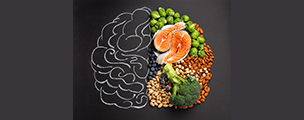Did You Know?

Seventy-five percent of disordered eating is due to emotional reasons. Often, we turn to food to soothe our feelings and calm our emotions.

Disordered eating is often a tool to create a feeling of control when life feels out of control. Our brain connects the ability to survive with the ability to act upon our world in an effective manner. If we feel ineffective our survival brain will often create ways in which to feel effective. Our brain wants us to survive at all costs.



Functional Nutrition and Food Plans
Food is too important to health for it not to be enjoyed, yet often food is associated with stress and fear.
“I don’t know what to eat”
“I can’t eat, I put on weight just looking at food”
“There’s nothing I can eat because everything makes me feel bloated”
“I can’t eat because I’ll be on the toilet for the rest of the evening”
“I have such cravings; I can’t stop eating”
“Sugar is the only thing that makes me feel better”
If this sounds familiar, you’re not alone. For many, food is stressful—what to eat, how to eat, how to shop, how to cook, and for others it’s a love/hate relationship. The fact is that our health is always impacted when we don’t eat right.

Changing your relationship with food is important because getting it wrong is the most powerful root cause of poor health. As the primary foundational stressor, food can be THE cause for the presence of almost any other underlying stressor. Nutrient deficiencies and imbalances and incomplete enzyme reactions disrupt metabolic pathways and in numerous ways undermine metabolism.
What is food to the body? According to The Institute for Functional Medicine, food is energy, information, medicine and connection.
Food is our fuel. Just like a car we need the right food mix to function optimally. We need proteins, carbs and fats. We need vitamins and minerals, and we need plant-derived substances that have a positive impact on our health. Food is far more than just our energy source. It is also information, telling our body how to function by signaling when and how each different type of cell should behave in any situation. We need the best information to reach our cells so that they function optimally. Food is also medicine to the body. It contains many different components that play important roles in our bodily functions. Poor-quality food can create disease while good quality food, in the right proportions and amounts, can reverse disease and sustain health. Lastly, food provides connection. It brings people together in the planning, preparation and eating of meals, either at end of each day or around celebrations and ceremonies.
The key to getting food right is to understand that we are all different—each one of us requiring a different food mix. There is no one, single way of eating that works for everyone. One of the first steps in functional health is helping you understand how you should be eating for you. What is your personal fuel mix of proteins, carbs and fats? Are you a protein type or a carb type? Just as important is understanding what you shouldn’t be eating—what’s interfering with your health and causing inflammation? You likely to know what you are allergic to but do you know what you’re sensitive to? Lastly, we need to know what you’re deficient in so we can properly support the body. If you have gut issues these will typically lead to nutrient deficiencies as food is not adequately broken down and absorbed correctly.
When you give the body the right foods and remove those foods that are interfering with your health, you’ll see your body rebound in a positive way. From this foundation we can make more focused changes that support lowering blood sugar, losing stubborn weight or eliminating bloating.
Let your food work for you rather than against you. Call today to schedule your Functional Health Assessment and begin your personal empowerment journey to a new life fueled by your brain and body’s personalized nutrition program.
“Food that you eat can be the safest and most powerful form of medicine or the slowest form of poison.” (Ann Wigmore).
We believe that food should be savored and enjoyed
Visit our Living Your Excellence Blog
Are you ready for empowered change? It’s time to live your excellence. Choose from our articles below to explore how the latest advances in neuroscience create opportunities for harnessing the power of neuroplasticity, and create a space for inspiration to flow.




















